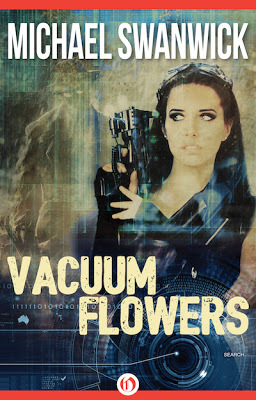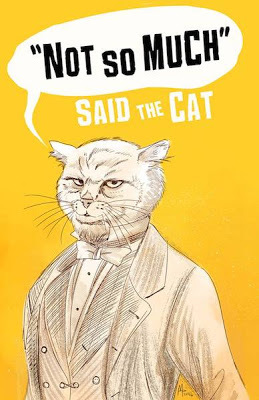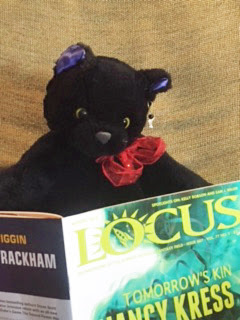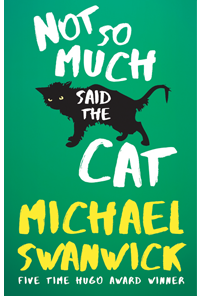Michael Swanwick's Blog, page 110
August 3, 2016
Vacuum Flowers e-Book Sale TODAY ONLY!
.

At the risk of making this blog look like yet another Advertisement-for-Me, I feel obliged to share the following commercial news:
Open Road Media, which has published e-books of five of my novels and one collection (listed below*) has arranged a one-day sale of Vacuum Flowers for $1.99 -- today only!
Vacuum Flowers is my half-cyberpunk, half-humanist exploration of the Solar System at a time when human personalities can be bought, sold, chopped and customized. Its protagonist is named Rebel Elizabeth Mudlark and if that doesn't pique your curiosity, then this probably isn't the book for you.
But if you're an e-book reader and have always been curious about this particular title, this is your opportunity to buy it cheap.
You can find this one-time-good-deal-only here.
There are also a few other books briefly on sale. The Sherman Alexei looks like it would be a wise buy
And, yes, I know...
... that the cover is inaccurate since everyone in the novel wears a cache-sexe and nothing else. At the time, I reasoned that when every human habitat is climate-controlled people would either wear next to nothing or else clothes of Victorian complexity. Then I flipped a coin. I didn't take into account the troubles this would cause cover-artists in years to come.
The contradiction, then, falls on me. I apologize for that. Why not buy the book anyway?
* The Iron Dragon's Daughter,Bones of the Earth, Vacuum Flowers,In the Drift,Jack Faust, and Tales of Old Earth

At the risk of making this blog look like yet another Advertisement-for-Me, I feel obliged to share the following commercial news:
Open Road Media, which has published e-books of five of my novels and one collection (listed below*) has arranged a one-day sale of Vacuum Flowers for $1.99 -- today only!
Vacuum Flowers is my half-cyberpunk, half-humanist exploration of the Solar System at a time when human personalities can be bought, sold, chopped and customized. Its protagonist is named Rebel Elizabeth Mudlark and if that doesn't pique your curiosity, then this probably isn't the book for you.
But if you're an e-book reader and have always been curious about this particular title, this is your opportunity to buy it cheap.
You can find this one-time-good-deal-only here.
There are also a few other books briefly on sale. The Sherman Alexei looks like it would be a wise buy
And, yes, I know...
... that the cover is inaccurate since everyone in the novel wears a cache-sexe and nothing else. At the time, I reasoned that when every human habitat is climate-controlled people would either wear next to nothing or else clothes of Victorian complexity. Then I flipped a coin. I didn't take into account the troubles this would cause cover-artists in years to come.
The contradiction, then, falls on me. I apologize for that. Why not buy the book anyway?
* The Iron Dragon's Daughter,Bones of the Earth, Vacuum Flowers,In the Drift,Jack Faust, and Tales of Old Earth
Published on August 03, 2016 08:40
August 2, 2016
Beelzebub in Yellow
.

How cool is this? Artist Manuel Preitano , inspired by the title of my new collection, Not So Much, Said the Cat, took it on himself to draw Beelzebub as a long-time rival to the arch-grifter and dog of action, Sir Blackthorpe Ravenscairn de Plus Precieux (known to his friends as Surplus).
Admit it. You want to see those two tangle.
Manuel Preitano also did the quite charming cover for the Italian edition of Dancing With Bears, His portfolio page, with that illustration, can be found here.
*

How cool is this? Artist Manuel Preitano , inspired by the title of my new collection, Not So Much, Said the Cat, took it on himself to draw Beelzebub as a long-time rival to the arch-grifter and dog of action, Sir Blackthorpe Ravenscairn de Plus Precieux (known to his friends as Surplus).
Admit it. You want to see those two tangle.
Manuel Preitano also did the quite charming cover for the Italian edition of Dancing With Bears, His portfolio page, with that illustration, can be found here.
*
Published on August 02, 2016 08:05
August 1, 2016
"One of the Master Short Fiction Writers..."
.

I'm home!
And in the mail to greet me is this month's Locus , with Gary K. Wolfe's review of my just-published new collection Not So Much, Said the Cat. Here's some of what he had to say:
And also:
I never express gratitude for a review because that seems to me an insult to the reviewer. Thanking one for a positive review would imply that the review had been slanted as a favor to the writer under question. But there's no denying that I found this review very satisfying.
And for those who crave food for literary thought...
Also in the August Locus is an interview with David D. Levine, in which drops this intriguing theory by our old friend Anonymous (but maybe the interview will prompt the theory's creator to step forward and take a bow.):
Which, true or not, you have to admit is pretty nifty. I could argue it both ways.
This is, incidentally, one of many reasons I subscribe to Locus -- to be surprised by intelligent discourse.
Above: Beelzebub, minor prince of darkness, checking out his reviews.
*

I'm home!
And in the mail to greet me is this month's Locus , with Gary K. Wolfe's review of my just-published new collection Not So Much, Said the Cat. Here's some of what he had to say:
Michael Swanwick has been one of the master short fiction writers in the field for decades, and one of the most eclectic. He seems to know so many traditions of fantastic literature that you can sense his glee at being able to juggle them, often in the same story, in a way that is somehow both deeply original and playfully allusive.
And also:
Even when a story begins with a sequence that seems familiar from a hundred SF or horror stories, Swanwick opens it out in unexpected ways, and demonstrates as consistently as anyone now working that the craft oft he literary short story and the materials of SF and fantasy can not only be compatible, but impressively synergetic.
I never express gratitude for a review because that seems to me an insult to the reviewer. Thanking one for a positive review would imply that the review had been slanted as a favor to the writer under question. But there's no denying that I found this review very satisfying.
And for those who crave food for literary thought...
Also in the August Locus is an interview with David D. Levine, in which drops this intriguing theory by our old friend Anonymous (but maybe the interview will prompt the theory's creator to step forward and take a bow.):
I read an essay in a fanzine years ago... predicated on the idea that science fiction grew out of a tradition of sea stories that started in the 1700s...The idea that you can travel from one planet to another in a matter of weeks or months rather than days or decades. The fact that the captain of the starship is the one who is in charge, that there is no effective communications between captains and their bosses back home, the relationships of people within the ship, the relationships of people on the ship to the places they arrive, the idea that each island has a single culture -- a single climate, a single religion, a single language -- all of these science-fiction tropes come directly from the sailing mechanics and realities of 1700.
Which, true or not, you have to admit is pretty nifty. I could argue it both ways.
This is, incidentally, one of many reasons I subscribe to Locus -- to be surprised by intelligent discourse.
Above: Beelzebub, minor prince of darkness, checking out his reviews.
*
Published on August 01, 2016 13:02
July 22, 2016
And As Always...
.

I'm on the road again!
Well, I will be tomorrow. I'll be teaching at Clarion West in Seattle all next week. Originally the Week Six teacher was scheduled to be Geoff Ryman, who is a wonderful writer, an admirable human being, and one of the most likable guys you could ever hope to meet. Alas, he fell afoul of a Kafkaesque bureaucratic mixup that has temporarily deprived him of his passport, stranding him in the U. K.
This means that I PROBABLY WON'T BE BLOGGING AT ALL NEXT WEEK. When I teach, the students get everything I have. Nothing is certain in this phenomenal world, of course. But I doubt I'll have the time or energy to post anything here.
I'll be back here on Monday, August 1st.
In the meantime, if you'd like to support Clarion West, you can find their website and contribute to their Write-a-thon here.
Or, if you'd like to support the genre in a more cerebral manner, you could read one of Geoff's novels. I am particularly enthusiastic about The Child Garden and Air, but anything by Ryman is first-rate. The man is astonishing.
*

I'm on the road again!
Well, I will be tomorrow. I'll be teaching at Clarion West in Seattle all next week. Originally the Week Six teacher was scheduled to be Geoff Ryman, who is a wonderful writer, an admirable human being, and one of the most likable guys you could ever hope to meet. Alas, he fell afoul of a Kafkaesque bureaucratic mixup that has temporarily deprived him of his passport, stranding him in the U. K.
This means that I PROBABLY WON'T BE BLOGGING AT ALL NEXT WEEK. When I teach, the students get everything I have. Nothing is certain in this phenomenal world, of course. But I doubt I'll have the time or energy to post anything here.
I'll be back here on Monday, August 1st.
In the meantime, if you'd like to support Clarion West, you can find their website and contribute to their Write-a-thon here.
Or, if you'd like to support the genre in a more cerebral manner, you could read one of Geoff's novels. I am particularly enthusiastic about The Child Garden and Air, but anything by Ryman is first-rate. The man is astonishing.
*
Published on July 22, 2016 00:30
July 20, 2016
Beelzebub On Tour
.

My life is an odd thing, sometimes. Case in point. I've been conducting a Cat Tour with Beelzebub ("Not the real one, obviously," as I never tire of mentioning he said in "Of Finest Scarlet Was Her Gown" ) to support the any-minute-now publication of Not So Much, Said the Cat, my brilliant new collection of short fiction. Forthcoming from Tachyon Publications.
The highlight of the Cat Tour had to be Beelzebub's participation in a Scotch-tasting party at Roscon, Russia's national science fiction convention. But he's been seen many other places as well, from Red Square to Baltimore.
Pictured above is Beelzebub keeping a sharp lookout for trouble in Mattapoisett, an old Massachusetts whaling port on beautiful Buzzard's Bay.
More adventures are forthcoming.
*

My life is an odd thing, sometimes. Case in point. I've been conducting a Cat Tour with Beelzebub ("Not the real one, obviously," as I never tire of mentioning he said in "Of Finest Scarlet Was Her Gown" ) to support the any-minute-now publication of Not So Much, Said the Cat, my brilliant new collection of short fiction. Forthcoming from Tachyon Publications.
The highlight of the Cat Tour had to be Beelzebub's participation in a Scotch-tasting party at Roscon, Russia's national science fiction convention. But he's been seen many other places as well, from Red Square to Baltimore.
Pictured above is Beelzebub keeping a sharp lookout for trouble in Mattapoisett, an old Massachusetts whaling port on beautiful Buzzard's Bay.
More adventures are forthcoming.
*
Published on July 20, 2016 14:56
July 18, 2016
One Rule To Ring Them All
.

It's Monday and suddenly I'm swamped with work. No time for anything deep. So I thought I would share with you the One Rule of Writing that Overrules All Other Rules.
The thing is that writing is not a single skill. It is a family of skills all of which result in superficially similar end-products. This means that no single piece of writing advice works for all writers. Write every day? Works great for many of us. Totally useless advice for others. Write from your own experience? Invaluable for some Not so great for people who write about zombies, alien planets, and serial killers. And so on.
So when a reputable source offers writing advice, keep an open mind. Try it. If it works, pat yourself on the back and put it in the tool box. If it doesn't, discard it without regret. It's still good advice. But it's good advice for some other kind of writer.
One piece of advice that's almost invariably true is this: Your characters have to interact with each other. Otherwise, no story. Invariably true. Almost.
I say almost because I advised someone on a story a while back and recently he shared with me his revised version. In it nobody interacted at all. That was, in fact, the point of the story. It worked. And there's no arguing with that.
So here's the One Rule: Anything you can get away with, you've gotten away with.
So endeth my sermon. Go ye and write better stories.
*

It's Monday and suddenly I'm swamped with work. No time for anything deep. So I thought I would share with you the One Rule of Writing that Overrules All Other Rules.
The thing is that writing is not a single skill. It is a family of skills all of which result in superficially similar end-products. This means that no single piece of writing advice works for all writers. Write every day? Works great for many of us. Totally useless advice for others. Write from your own experience? Invaluable for some Not so great for people who write about zombies, alien planets, and serial killers. And so on.
So when a reputable source offers writing advice, keep an open mind. Try it. If it works, pat yourself on the back and put it in the tool box. If it doesn't, discard it without regret. It's still good advice. But it's good advice for some other kind of writer.
One piece of advice that's almost invariably true is this: Your characters have to interact with each other. Otherwise, no story. Invariably true. Almost.
I say almost because I advised someone on a story a while back and recently he shared with me his revised version. In it nobody interacted at all. That was, in fact, the point of the story. It worked. And there's no arguing with that.
So here's the One Rule: Anything you can get away with, you've gotten away with.
So endeth my sermon. Go ye and write better stories.
*
Published on July 18, 2016 12:52
July 15, 2016
Universe Box Preview
.

The other day I posted a photo of the first completed box of the Universe Boxes Project . Now here's a glimpse of the interior. Pretty nifty, eh?
The Universe Boxes are issued in an edition of thirteen, of which ten will be offered up for sale by Dragonstairs Press, the nanopublishing juggernaut founded and operated by Marianne Porter. At their center is a stab-bound book with decorative papers containing a 10,500-word story, "Universe Box," written by me. It has never been published before, so this is a true first edition.
Here's how it begins:
You'll notice that not only is the book itself autographed by the author, but the contents list is autographed by both Marianne Porter and me. That's not only because the work modifying the cigar boxes and the selection of found and created items was done by Ms Porter but also because each box contains a "vaccine," one of a series of small artworks she has created, in which select items are sealed permanently in vaccine bottles, an activity straddling the line between art and shamanistic activity.
Some items within the box, such as the book and a bundle of calling cards for characters in the story, are common to all the boxes. Some are common to other boxes but not to all. And some are unique to each box.
I exist in order to create interesting things. So you can imagine how happy I am with this collaboration.
Nota bene: Dragonstairs Press does not do pre-orders, even for dear friends. A week before the boxes go on sale, information about them will be posted on the Dragonstairs website here.
Above: Photo by Henry Wessells. Whose website at http://endlessbookshelf.net is well worth your perusal.
*

The other day I posted a photo of the first completed box of the Universe Boxes Project . Now here's a glimpse of the interior. Pretty nifty, eh?
The Universe Boxes are issued in an edition of thirteen, of which ten will be offered up for sale by Dragonstairs Press, the nanopublishing juggernaut founded and operated by Marianne Porter. At their center is a stab-bound book with decorative papers containing a 10,500-word story, "Universe Box," written by me. It has never been published before, so this is a true first edition.
Here's how it begins:
Out of the everywhere and nowhere the thief fled, quarks and galaxies crunching underfoot, vacuum rippling like a banner in his wake. Skipping nimbly in and out of space and time, he dropped down into the quantum slush underlying physical existence and then up again into the macrocosmic realms of which reality is but the tiniest province. Nightmares beyond human imagining howled and ravaged at his heels. Nihilism and despair sleeted down on his upturned face. But the thief couldn’t have been happier. His grin was so mad and bright that it would melt granite.
His erection was shocking.
You'll notice that not only is the book itself autographed by the author, but the contents list is autographed by both Marianne Porter and me. That's not only because the work modifying the cigar boxes and the selection of found and created items was done by Ms Porter but also because each box contains a "vaccine," one of a series of small artworks she has created, in which select items are sealed permanently in vaccine bottles, an activity straddling the line between art and shamanistic activity.
Some items within the box, such as the book and a bundle of calling cards for characters in the story, are common to all the boxes. Some are common to other boxes but not to all. And some are unique to each box.
I exist in order to create interesting things. So you can imagine how happy I am with this collaboration.
Nota bene: Dragonstairs Press does not do pre-orders, even for dear friends. A week before the boxes go on sale, information about them will be posted on the Dragonstairs website here.
Above: Photo by Henry Wessells. Whose website at http://endlessbookshelf.net is well worth your perusal.
*
Published on July 15, 2016 00:30
July 14, 2016
In Which I Am Interviewed by Chris Urie
.

The industrious Chris Urie, writer and Associate Editor at Geekadelphia , has interviewed me for Clarkesworld . The occasion is the imminent (soon! very soon! sometime this month!) of my new Tachyon Publications collection, Not So Much, Said the Cat.
Her's how it begins:
You can find the entire interview here. Or you can simply go to Clarkesworld itself here and poke around, maybe read a few stories. It publishes a lot of good fiction.
*

The industrious Chris Urie, writer and Associate Editor at Geekadelphia , has interviewed me for Clarkesworld . The occasion is the imminent (soon! very soon! sometime this month!) of my new Tachyon Publications collection, Not So Much, Said the Cat.
Her's how it begins:
Why does the cat say “not so much?”
He’s a character in a story about a young teenaged girl’s attempt to rescue her father from Hell. Beelzebub is there for whatever reasons a cat would be sent to perdition, and when he delivers that line he’s telling the girl that she might be lovely to look at for other humans, but for a cat . . . Which he does simply because he’s a contrarian and in Hell honesty is an offense to local community standards.
I hadn’t thought of this before, but Beelzebub—“Not the famous one, obviously,” as he says—and I have a lot in common. We both enjoy telling the truth in unexpected ways.
You can find the entire interview here. Or you can simply go to Clarkesworld itself here and poke around, maybe read a few stories. It publishes a lot of good fiction.
*
Published on July 14, 2016 06:16
July 13, 2016
Stop Ending Your Stories Like That!
.

It's hot, I've got work to do, and I don't have any news about forthcoming publications. So here's a quick piece of writing advice:
Stop ending your stories like that!
By which I mean your science fiction stories. And what ticks me off about the way your science fiction story ends is that, after a great deal of suspension of disbelief, after things happen that couldn't possibly happen in the real world, after using up a small but irreplaceable fraction of the time I have left on this planet... you resolve it by having the protagonist feel better.
This is so very, very common. The traumatized veteran of a intergalactic war has an encounter with a sentient war machine and, after discovering their common posthumanity, feels better. The widower invents a machine that allows him to talk to his dead wife, and feels better. An astronaut on Pluto, awaiting rescue, becomes reconciled to his fate and also to the late father who could never express affection for her and feels better. I made up these examples off the top of my head, but they read a lot like stories I've read recently.
The problem is that this isn't a science fiction plot. Science fiction is about change -- and the more challenging the change, the better. Think how much better those stories would be if the vet merged with the war machine, becoming a new organism. Or if the dead wife enlisted her husband's help to escape from Hell. Or if the astronaut died and discovered that when chilled to Plutonian temperatures, the brain keeps on thinking, though the body is inert.
I'm not saying you can't sell stories with and-the-protagonist-felt-better endings. Obviously, they sell all the time. But you're not going to win any awards with them
And before you call me a hypocrite...
Yes, I've done it myself. "An Empty House With Many Doors" has exactly that ending. It was a good story, and I'm not about to apologize for it.
Didn't win any awards, though.
*

It's hot, I've got work to do, and I don't have any news about forthcoming publications. So here's a quick piece of writing advice:
Stop ending your stories like that!
By which I mean your science fiction stories. And what ticks me off about the way your science fiction story ends is that, after a great deal of suspension of disbelief, after things happen that couldn't possibly happen in the real world, after using up a small but irreplaceable fraction of the time I have left on this planet... you resolve it by having the protagonist feel better.
This is so very, very common. The traumatized veteran of a intergalactic war has an encounter with a sentient war machine and, after discovering their common posthumanity, feels better. The widower invents a machine that allows him to talk to his dead wife, and feels better. An astronaut on Pluto, awaiting rescue, becomes reconciled to his fate and also to the late father who could never express affection for her and feels better. I made up these examples off the top of my head, but they read a lot like stories I've read recently.
The problem is that this isn't a science fiction plot. Science fiction is about change -- and the more challenging the change, the better. Think how much better those stories would be if the vet merged with the war machine, becoming a new organism. Or if the dead wife enlisted her husband's help to escape from Hell. Or if the astronaut died and discovered that when chilled to Plutonian temperatures, the brain keeps on thinking, though the body is inert.
I'm not saying you can't sell stories with and-the-protagonist-felt-better endings. Obviously, they sell all the time. But you're not going to win any awards with them
And before you call me a hypocrite...
Yes, I've done it myself. "An Empty House With Many Doors" has exactly that ending. It was a good story, and I'm not about to apologize for it.
Didn't win any awards, though.
*
Published on July 13, 2016 08:34
July 11, 2016
Meanwhile, Back In Nairobi...
.

Earlier this year, I was in Moscow for Roscon, the Russian national science fiction convention, and on a panel Nick Perumov asked an extremely good question, one that forced me to think about something I'd never considered before. He asked whether the proliferation of science fiction around the world and in Africa in particular wasn't promoting globalization and the weakening of indigenous cultures by forcing people to write in a manner and in a literary tradition that was not their own.
(He wasn't saying that it did, I should make clear. But he wanted us to take sides and defend our positions.)
Unfortunately, because everything anybody said had to be translated, we came to the end of our time slot before I could give my answer. Which was: "No. Globalization is already happening. Science fiction is a set of concepts and literary tools that people anywhere can pick up and use to fight back."
Now, over at Tor.com Geoff Ryman has posted part one of an essay titled 100 African Writers of SFF -- and it's an eye opener. As it turns out, there are many, many writers employing fantasy & science fiction in Africa for exactly that reason: To stake a claim to their part of the future, to establish their own voices, and to pass their own judgements on what's happening now and slated to happen in the years to come.
And of course they've been doing this for years.
Ryman's article sketches out complex situations, innovate creators, and a complicated relationship with Western culture. There are writers who grew up rarely speaking their native language because English is much more prestigious in the business world. Others have lived in the United States, but chose to return home. (At least one is moving to China to find work.) Several, when asked to cite their influences list books that are classics in the West. Everyone profiled is smart and perceptive. Only a few have their works excerpted, but when that happens, the prose is convincing. Here's an example from a story by Alexander Ikawa:
You can -- and, if you're interested in science fiction and fantasy, I think you should -- read the entire first half of the article here.
I look forward to the second half with glad anticipation.
Above: Geoff writes, "You will hear a lot about Kwani? ('Why?' in Swahili) in this series. When Binyavanga Wainaina won the Caine Prize in 2003 he set up the company with the Prize money. The company publishes regular, book-like anthologies, individual novels and collections, runs the monthly Kwani? Open Mic nights and sponsors the Kwani? MS Award, which resulted in the first publication of Nansubaga Makumbi’s Kintu and also of Nikhil Singh’s Taty Went West. Kwani? was one of the sponsors of the workshop that resulted in the foundation of the Jalada collective."
*

Earlier this year, I was in Moscow for Roscon, the Russian national science fiction convention, and on a panel Nick Perumov asked an extremely good question, one that forced me to think about something I'd never considered before. He asked whether the proliferation of science fiction around the world and in Africa in particular wasn't promoting globalization and the weakening of indigenous cultures by forcing people to write in a manner and in a literary tradition that was not their own.
(He wasn't saying that it did, I should make clear. But he wanted us to take sides and defend our positions.)
Unfortunately, because everything anybody said had to be translated, we came to the end of our time slot before I could give my answer. Which was: "No. Globalization is already happening. Science fiction is a set of concepts and literary tools that people anywhere can pick up and use to fight back."
Now, over at Tor.com Geoff Ryman has posted part one of an essay titled 100 African Writers of SFF -- and it's an eye opener. As it turns out, there are many, many writers employing fantasy & science fiction in Africa for exactly that reason: To stake a claim to their part of the future, to establish their own voices, and to pass their own judgements on what's happening now and slated to happen in the years to come.
And of course they've been doing this for years.
Ryman's article sketches out complex situations, innovate creators, and a complicated relationship with Western culture. There are writers who grew up rarely speaking their native language because English is much more prestigious in the business world. Others have lived in the United States, but chose to return home. (At least one is moving to China to find work.) Several, when asked to cite their influences list books that are classics in the West. Everyone profiled is smart and perceptive. Only a few have their works excerpted, but when that happens, the prose is convincing. Here's an example from a story by Alexander Ikawa:
Night was the best time to visit Quadrant 7 if you were looking for mem-bits from the 21st. Old men too poor to afford to make money any other way, sold priceless memories for as little as 100 EA$. They sold to me cheaply because I bought memories nobody else wanted. Love, pain, laughter, and happiness, but mostly I bought history. I paid extra for memories of childhood in the late 21st; before the water and energy rations, even before ZEOS itself. I had a modest website where I uploaded them for free, and it was getting quite well known. I wasn’t the only one looking for the feelings we had lost. The vicious gangs that ran the quadrant did it differently though. They almost exclusively bought sexual memories, and then violence, thrills, and intoxication in that order. And if you owed them for food or a place to sleep as most of the old men did, they paid you nothing. They preferred to rip them for quality, erasing the memory from its donor’s mind completely. Gaps in the mind drove you crazy after a while, and the quadrant streets were full of people who had sold too much, wandering the streets trying to relearn things they had known all their lives.
You can -- and, if you're interested in science fiction and fantasy, I think you should -- read the entire first half of the article here.
I look forward to the second half with glad anticipation.
Above: Geoff writes, "You will hear a lot about Kwani? ('Why?' in Swahili) in this series. When Binyavanga Wainaina won the Caine Prize in 2003 he set up the company with the Prize money. The company publishes regular, book-like anthologies, individual novels and collections, runs the monthly Kwani? Open Mic nights and sponsors the Kwani? MS Award, which resulted in the first publication of Nansubaga Makumbi’s Kintu and also of Nikhil Singh’s Taty Went West. Kwani? was one of the sponsors of the workshop that resulted in the foundation of the Jalada collective."
*
Published on July 11, 2016 12:09
Michael Swanwick's Blog
- Michael Swanwick's profile
- 546 followers
Michael Swanwick isn't a Goodreads Author
(yet),
but they
do have a blog,
so here are some recent posts imported from
their feed.



